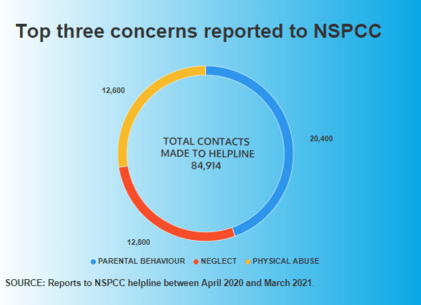Record numbers of adults raised child welfare concerns with the NSPCC during the height of the coronavirus pandemic.
Figures show the charity’s national helpline was contacted nearly 85,000 times between April 2020 and March 2021 – a 23% increase on the previous year.
The top concern involved the behaviour of parents such as alcohol and substance misuse and domestic abuse, which was reported more than 20,400 times.
There were also more than 12,800 contacts about neglect, 12,600 about physical abuse and 11,600 about emotional abuse.
Nearly half of all reports (47%) received were deemed so serious they were referred to the police or children’s services.

Sir Peter Wanless, NSPCC’s chief executive officer, said: “The record number of contacts to our helpline reinforces the need for governments across the UK to put children at the heart of their recovery plans.
“These must go beyond education and address the harm some have experienced so the pandemic doesn’t leave a legacy of trauma for children.”
The figures come in the wake of the Everyone’s Invited website receiving more than 16,000 testimonies of sexual abuse and rape culture in schools, colleges and universities since March 8.
It prompted the Department of Education to award the NSPCC £1.6 million to set up a confidential Report Abuse in Education helpline.
Billed as a “dedicated support system for children and young people who have been victims of abuse”, it also offers advice to adults such as carers and teachers who may have concerns about potential victims.
No data has been released on the number of calls to the helpline so far, but Mr Wanless said it comes at a “watershed moment” due to the pandemic keeping vulnerable youngsters hidden from sight of people who can keep them safe.
“The testimonies being shared through Everyone’s Invited are extremely upsetting and underline the urgent need to tackle violence against girls,” he told Overtime.
“At least a third of sexual offences against children are committed by other young people and that must be addressed.
“Creating a culture that fosters healthy relationships and challenges harassment and abuse is integral to this.
“With the right support for teachers, relationships and sex education has a pivotal role to play in achieving this.
“But this issue goes beyond schools and we all have a role to play in keeping children safe.”
- The Report Abuse in Education can be reached on 0800 136663 or by emailing help@nspcc.org.uk








